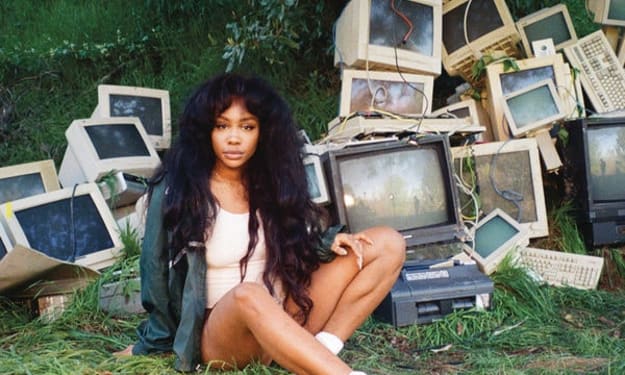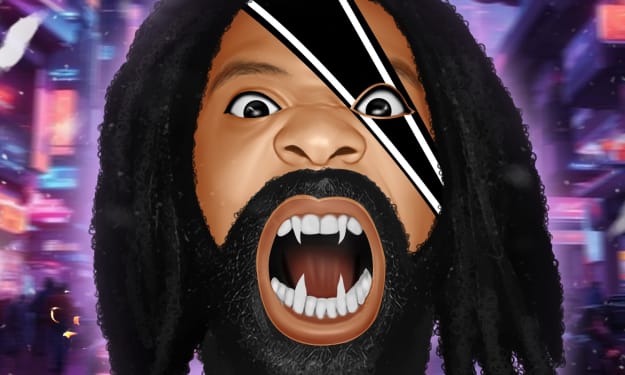Flower Boy Signaled A New Era for Tyler, The Creator
A noticeable difference in style for this artist

Flower Boy officially signaled the bloom of Tyler, The Creator as an artist. Being entirely produced by Tyler himself, the album feels deeply personal as we travel through the emotions of a lonely artist. Admittedly, I took me a while to warm up to this album. Upon my first listen on its release in 2017, I was shocked by how different this version of Tyler was, compared to the one I used to listen to on his infamous Goblin and Bastard albums. The once abrasive, and almost offensive, rapper had changed — and perhaps, for the better.
The most amicable way I can explain this transition is how Tyler begins to process his emotions. In the earlier era, he would speak to a sort of narrator/therapist in a sarcastic and even angry tone. This anger could arise from sexual frustration in relation to his sexual preference, his performance as an artist, the weight of fame, or a plethora of other things we couldn’t begin to imagine. In these talks with this “therapist”, Tyler would lash out often and pull a nonchalant, abrasive front. See songs like “Goblin”, “Yonkers”, and “Nightmare”.
Then something changes. In the same time frame as the release of Flower Boy, it becomes accepted public knowledge that Tyler is part of the LGBTQ+ community. The nuance here is the “accepted” part, as Tyler had been dropping “hints” in a plethora of old videos, interviews, clips, and music. The personality type of this artist made it seems to most like he was joking when he says things like, “I like white boys.” Ultimately, Flower Boy would serve as a public service announcement, of sorts, in order to validate his emotions and thereby, confirm his sexuality.
Sticking to the classic low pitch, talkative rapping style, Tyler, The Creator adds singing and perfect features to create one of the best albums in the past 5 years. With features from Rex Orange County, Frank Ocean, Kali Uchis, and Jaden Smith among others, each one provides a unique counterpart to Tyler’s verses. I was pleasantly surprised with the Rex Orange County features and how well he fit in the vibe of the song. From the very beginning with “Foreword”, you can tell this is a different era of Tyler, The Creator. It seems much more relaxed, absent of that anger I was so accustomed to. He isn’t rapping at us anymore, he’s rapping to us — relaying his emotions, rather than throwing or dropping a bomb on us.
“Where This Flower Blooms” dives into both Tyler’s past and present as he explores exploratory masculinity and how it can be seen as fragile or weak in comparison to the heteronormative view of masculinity. Tyler’s message in this song is that beyond these toxic boundaries are the chance for growth as he currently on his way to this esteemed growth and expression. The tandem of him and Frank Ocean has always proven to be lethal, as they have collaborated several times over the past 7–8 years.
Another mutually beneficial collaboration is with Kali Uchis. In “See You Again”, both sing of a beautiful love and the longing that comes with the honeymoon phase of a relationship. This song is one of my favorites, as I am personally infatuated with Kali Uchis. However, according to Tyler himself, this is his favorite song as well. This song just makes you feel like you’re falling through a void while madly in love — when you listen, you automatically picture that one person.
As much as we dread potholes, most of the time they are unavoidable experience in our drive. In our endeavor to pursue and drive forward, natural obstacles will be in the way hindering our progress; however, if you’re lucky, you’ll miss the potholes entirely. Tis the lesson Tyler preaches in “Pothole” with Jaden Smith. Here, we are more grounded in the reality that life will strike you down given the chance. We are also introduced to Clancy, an old man (his manager) that Tyler credits as a huge influence in his life and often a reason he is sits at the top. Tyler speaks of Clancy later in the album as well as he is a pivotal person in his life.
Perhaps the most important song on the album, “Garden Shed”, Tyler confirms his sexuality and his apprehensiveness to “come out of the garden shed”. Tyler explains that the love he experienced with this partner was real but he was almost ashamed of it. He also wanted to tell his friends but they wouldn’t really listen, as I mentioned before, most believed Tyler to be joking when he said things like this. This would be incredibly invalidating for Tyler and his sexuality thereby, initiating and reconfirming the shame he experienced.
That is where I was hidin’
That was real love I was in
Ain’t no reason to pretend
[…]
Them feelings that I was guardin’
Heavy on my mind
All my friends lost
They couldn’t read the signs
I didn’t wanna talk and tell ’em my location
And they ain’t wanna walk
Truth is, since a youth kid, thought it was a phase
Thought it’d be like the phrase; “poof,” gone
But, it’s still goin’ on
In my favorite song of the album, Rex Orange County shows up again, along with Anna of the North in “Boredom”. This song is a call to find some time to do something that you love or something that you would consider a break from your regularly scheduled life. If not, boredom will become your new best friend. In addition, becoming a slave to routine will dull your sparkle considerably. In Tyler’s life as a celebrity, he hardly has the time to communicate with friends and often finds himself trying to alleviate his boredom by his lonesome. The very next song is a brash contradiction in which Tyler adamantly says he “Ain’t got time!”
Boredom got a new best friend
In “November”, Tyler is reminiscent of a time that seems much simpler. This is one of the smoothest songs on the album. He also questions everything about his being and everything that led up to this song, including Clancy and his success. The insecurities force Tyler to look back at “November”. November, in the grand scheme of the song, isn’t the month but rather a memory that you look so fondly upon that it seems so far away from the current person you are — ultimately, nostalgia. In the song, there are several anecdotes from people explaining what their November is. I think my November is my freshman year of college in my shitty dorm room with my best friend having the time of our life. What is your November?
Flower Boy signaled the beginning of a new era for Tyler, The Creator and would go on to capture even those that staunchly opposed his older music. In a tell-all album, Tyler embraced his sexuality, loneliness, and his insecurities while telling his story of growth. This album along with the follow up album, Igor would go on to be critically-acclaimed topping charts all over the world. As we approach Tyler’s next album, “CALL ME IF YOU GET LOST”, this album is a perfect reminder of his growth as an artist and as a person.
Originally published in Modern Music Analysis on Medium
About the Creator
Josh Herring
Emerging writer and published poet | Owner of Modern Music Analysis music publication







Comments
There are no comments for this story
Be the first to respond and start the conversation.